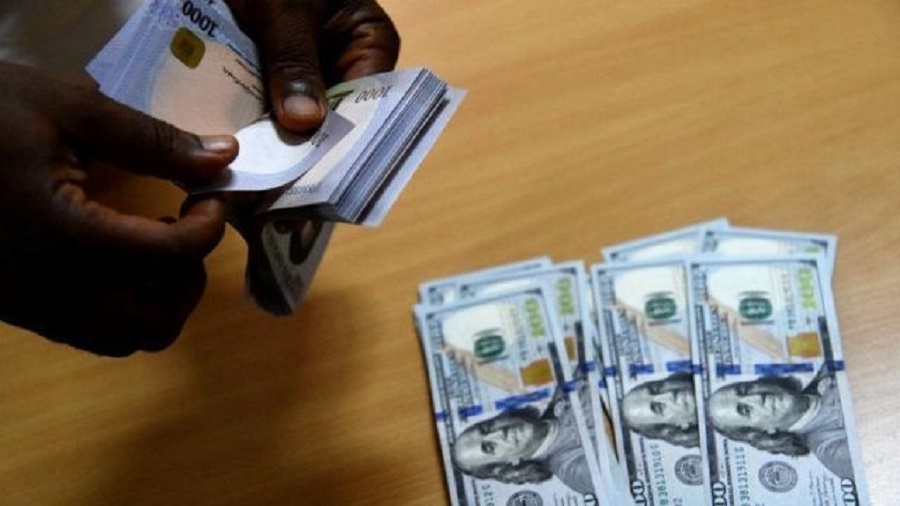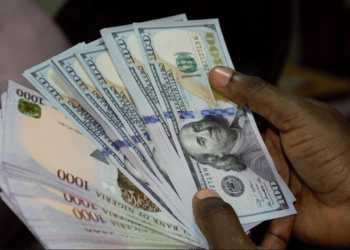Monday, 13th December 2021: The exchange rate between the naira and the US dollar closed at N414.06/$1 at the official Investors and Exporters (I&E) window.
Naira appreciated marginally against the US dollar on Monday to close at N414.06/$1. This represents a 0.25% gain when compared to the N415.10 that was recorded in the previous trading sessions as a drop in the country’s external reserves continues with a decline of $17 million.
However, the naira remained stable against the US dollar on Monday as it closed at N575/$1. This was the same rate that was recorded in the previous trading session. This is according to information obtained from BDC operators interviewed by Nairametrics.
The local currency gained at the official market as the forex turnover improved by 43.8% during Monday’s trading session.
Trading at the official NAFEX window
The exchange rate at the Investors and Exporters window depreciated to close at N414.06/$1 on Monday, representing a N1.04 gain when compared to the N415.10/$1 that was recorded at the last trading session.
The opening indicative rate depreciated to close at N414.05/$1 on Monday, December 13, which represents a 36 kobo drop when compared to the N413.69/$1 that was recorded in the previous trading session.
An exchange rate of N444/$1 was the highest rate recorded during intra-day trading before it settled at N414.06/$1, while it sold for as low as N405/$1 during intra-day trading.
Forex turnover at the official window rose by 43.8% to trade at $121.45 million on Monday.
According to data tracked by Nairametrics from FMDQ, forex turnover at the I&E window increased from $84.44 million on Friday 10th December 2021, to $121.45 million on Monday 13th December 2021.
Crude oil price
Oil extended its decline on Monday evening with Brent crude dropping by 0.54% to trade at $73.99 per barrel as an increase in OPEC’s demand forecast for next quarter was offset by uncertainty over the omicron virus variant.
West Texas Intermediate was little changed near $71 a barrel in Asia after slipping 0.5% on Monday.
OPEC on Monday raised its world oil demand forecast for the first quarter of 2022 and stuck to its timeline for a return to pre-pandemic levels of oil use, saying the Omicron coronavirus variant would have a mild and brief impact.
A monthly report from the group’s research department said that OPEC boosted estimates for oil consumption by 1.1 million barrels a day.
Oil has staged a partial recovery this month after tumbling into a bear market at the end of November.
Oil dropped 10% on November 26 when reports of the new variant emerged as traders feared a renewed hit to demand. But OPEC and its allies decided on December 2 to stick to a planned production increase for January, a gamble that looks to have paid off as prices stabilise.
The West Texas Intermediate went down by 0.59% to trade at $70.87 per barrel. Natural gas was down by 0.24% to trade at $3,785 while OPEC Basket dropped by 1.41% to trade at $74.03 per barrel.
On the other hand, Nigerian crude, Bonny Light went up by 0.13% to trade at $74.48 per barrel.
Cryptocurrency watch
The world’s largest and most popular cryptocurrency, Bitcoin, tumbled below a closely watched price level as the slide in the largest cryptocurrency from its all-time high extended into a fifth week.
Bitcoin declined by 4.89% to trade at $46,807.23 as it is now flirting with a breach of its closely watched 200-day moving average.
Bitcoin has dropped for four consecutive weeks as measured by the seven days ended Friday. Unlike most traditional asset classes and securities, digital tokens trade around the clock, often on lightly regulated online exchanges worldwide.
Recent declines across cryptocurrencies has some analysts concerned about near-term price direction, especially ahead of the U.S. Federal Reserve Open Market Committee (FOMC) meeting December 14-15.
Meanwhile, Ethereum, the world’s second largest cryptocurrency by market capitalization dropped by 7.62% to trade at $3,711.06.
External reserves
Nigeria’s external reserve dropped by 0.04% on Friday, 10th December 2021, to close at $40.888 billion. This represents a decrease of $17 million compared to $40.905 billion recorded as of the previous day.
The consistent decline that had been experienced in the country’s reserve level could be attributed to the continuous intervention of the apex bank in ensuring the stability of the exchange rate.
It is worth noting that the nation’s foreign reserve had gained $5.99 billion in the month of October, as a result of the $4 billion raised by the federal government from the issuance of Eurobond in the international debt market.
In the month of November, Nigeria’s external reserve lost $633.47 million in value as against a gain of $5.99 million recorded in the previous month and $2.76 million gain in September 2021. On a year-to-date basis, the reserve gain has reduced to $5.74 billion.















